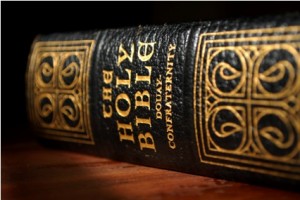Life as a Feast of Faith
by Marcellino D'Ambrosio, Ph.D. | August 17, 2012 12:01 am
Editor’s Note: Reflection on the Mass readings for the Twentieth Sunday in Ordinary Time (Year B) – Proverbs 9:1-6; Psalms 34:2-3, 10-11, 12-13, 14-; Ephesians 5:15-20; John 6:51-58[1]. This series usually appears each Wednesday.
 [2]
[2]Photography © by Andy Coan
From time to time I run across sophisticated people who don’t, of course, believe in God, at least not in the way he’s represented by organized religion. But they are very happy that the hoi polloi, the vast crowd of ordinary people, do believe in God. For to them, religion promotes basic morality in society which is, of course, something we all want.
Sometimes I think that even churchgoers have this very low expectation of what it means to be a Christian. “Believe that God exists and that he’ll judge you when you die. Consequently, try to be a decent, fair sort of person. Send your kids to CCD so they get this message and stay out of serious trouble.”
This Sunday’s readings shatter this tame image of what Christianity is all about. Jesus did not come to make us decent, law-abiding citizens. He came that we may have life, and have it more abundantly (Jn 10:10). He does not want us just to exist. He wants us to live, to be bursting with vitality, even with divine life.
Our God, of course, realizes that such vitality can only be achieved with the appropriate nourishment. So Wisdom has set a table for us, a banquet table, full of the most delectable victuals imaginable (Prv 9:1-6). Actually, one table is not enough. He lays out for us two tables, the ambo and the altar. One provides an intellectual feast of the Word of God, to nourish, purify and inspire with words, deeds and images that have fed the imagination of artists and sages for two thousand years. The other table is laden with the sacramental feast of the Eucharist, the body and blood of Jesus Christ.
Wait a minute. Isn’t cannibalism contrary to nature? Yes, but that’s not what we are talking about here. This is a sacramental feast, where, mysteriously, we are really receiving into ourselves the perfect humanity and awesome divinity of Jesus Christ, but we are eating and drinking his true body, blood, soul and divinity under the forms of things we are used to consuming – bread and wine.
To drink blood, for the Jew, is forbidden, since all life belongs to God alone and the blood of animal contains its life. Christ, giving us his blood to drink under the sacramental form of wine, is pouring into our bodies and spirits his own immortal, invincible life. As often as we receive this sacrament, we are receiving a divine transfusion empowering us to live a supernatural sort of existence.
But this is not just an offer on the Lord’s part. It’s a requirement. “If you do not eat the flesh of the Son of Man and drink his blood, you have no life in you.” Why do Catholics have a Sunday obligation not just to say prayers at home but to go to Mass? Why must we fulfill our “Easter duty” and receive communion at least once a year? Because the Church, as a loving Mother, would be remiss if it did not insist on this bare minimum nourishment for her children, that they may have life.
But why just be satisfied with the minimum? In our second reading Paul exhorts us: “Make the most of the present opportunity” (Eph 5:15-20) Carpe Diem. Seize the day. Receive this revitalizing sacrament as often as the circumstances of your life allow. Receive it worthily, arriving at the Lord’s table “pre-prayered” and lingering after the meal in silent adoration, that you may properly digest the feast. Approach the Eucharist not as some glum duty, but as an awesome privilege, your mind filled not with distractions but with inspired songs of gratitude and joy. Eucharist, after all, is just the Greek word for thanksgiving. We receive the banquet so that our lives may truly be an ongoing festival of thanksgiving for the amazing blessings that God has hidden everywhere under the guise of quite ordinary people, places, and things.
Dr. Marcellino D’Ambrosio writes from Texas. For his resources on parenting and family life or information on his pilgrimages to Rome and the Holy Land, visit www.crossroadsinitiative.com [3]or call 1.800.803.0118. This article originally appeared in Our Sunday Visitor and is reproduced here by permission of the author.
Please help us in our mission to assist readers to integrate their Catholic faith, family and work. Tell your family and friends about this article using both the Share and the Recommend buttons below and via email. We value your comments and encourage you to leave your thoughts below. Thank you! – The Editors
- Proverbs 9:1-6; Psalms 34:2-3, 10-11, 12-13, 14-; Ephesians 5:15-20; John 6:51-58: http://www.usccb.org/bible/readings/081912.cfm
- [Image]: http://www.integratedcatholiclife.org/wp-content/uploads/biblespine-coan.jpg
- www.crossroadsinitiative.com : http://www.dritaly.com/
Source URL: https://integratedcatholiclife.org/2012/08/dambrosio-sunday-reflection-life-as-a-feast-of-faith/